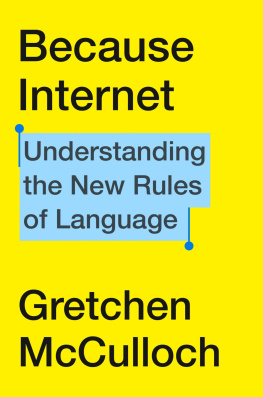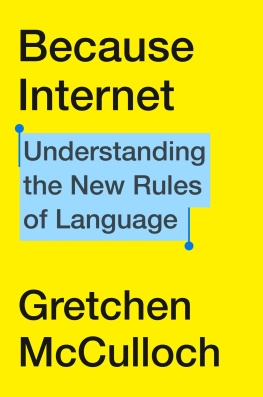Table of Contents
Praise for Clay Shirkys Here Comes Everybody
A fascinating survey of the digital age... [Shirky has] a knack for converting sociological concepts into easy-to-understand prose.... An eye-opening paean to possibility.
The Boston Globe
From blogs and Wikipedia to Facebook and Twitter, each new wave of digital communications generates more upheaval for businesses. In his recent book, Here Comes Everybody: The Power of Organizing Without Organizations, Clay Shirky explores the ramifications of a world in which people can find each other and collaborate with increasing ease.
The Wall Street Journal
Shirky convincingly argues that online communication tools are transforming everything from airlines to the Catholic Church. And the funs only just begun.
Wired
So brilliant and fun and provocative it stays with you for a while.
The Atlantic Monthly
Amateur circles of ordinary people are wresting power and creativity back from the oligarchs.... [Clay Shirky] offer[s] incisive analysis of the new day as it dawns.... Precise and intellectually fresh... Here Comes Everybody is more than a simple celebration of our happy, busy mobs; it offers frameworks by which to better understand them. By doing so, Shirky proves that, in the end, credentialed, knowledgeable, and clear-headed media and technology critics havent been rendered obsolete by the crowds they love. At least not yet.
The Village Voice
Mr. Shirky writes cleanly and convincingly about the intersection of technological innovation and social change; he makes both the science and the sociology accessible.
New York Observer
Shirkys book makes a great contribution by clearly explaining what is happening today. His methodical analysis is illuminating, jargon-free and comprehensive, extracting insights from a wide array of seemingly dissimilar ventures.... The times they are a-changin, and Shirky has written a lucid exposition on how people are starting to celebrate the internets true potential. Its tough to write a profound book that is also a great read but Shirky has done exactly that. This book will help groups of every shape and size harness the new power of collaboration.
Focus
Shirky calls for readers to acknowledge the new reality and look to the future.... His book is a compendium of smartly analyzed, real-world examples of just that, and it provides a good foundation for those looking to get a handle on the new ways of the world.
BusinessWeek
Fascinating anecdotes and smart writing.
Fortune Small Business
Drawing from anthropology, economic theory, and keen observation, [Shirky] makes a strong case that new communications tools are making once-impossible forms of group action possible.... Shirkys range of examples is exciting.... [An] extraordinarily perceptive new book.
Star Tribune (Minneapolis)
[Shirky] looks at self-organization with an academics eye, tinged by an appreciation of the commerce that underlies a fair amount of the Internet.
The Seattle Times
A terrific new book.
Kansas City Star
Shirky... has a novel response to the question of quality control: we will have to move to a publish-then-filter model, the opposite of todays gatekeeper structure.
Columbia Journalism Review
I dont think youll find a smarter, more articulate writer on the topic of internet community than Clay Shirky.... If youre developing social software of any kind, this book should be required reading.
D: All Things Digital
Meat and potatoes anecdotes about communication tools.
statesman.com
Seriously, Clay Shirkys new book is really good. (For once, no irony or snark: its just very well done.) Each time someone as insightful as Clay Shirky starts writing for the Web, the internet will get 1 percent better. Send 99 more Shirkys.
hotdogsladies.com
Remarkable.
politico.com
Terrifically clever.
Stuart Jeffries, Guardian (London)
A primer for the Information age.
Jain Finlayson, The Times (London)
[Shirky] provides the clearest explanation I have yet read of why Microsoft is being challenged by open-source software communities like Linux.
Pate Kane, The Independent (London)
Here Comes Everybody is as crisply argued and as enlightening a book about the internet as has been written. It might even cure your wikiphobia.
Telegraph Review (UK)
Shirky astutely discerns the implications of people acting on their own.... A perceptive appraisal of the contemporary technology-society interface.
Booklist
ABOUT THE AUTHOR
Clay Shirky writes, teaches, and consults on the social and economic effects of the internet, and especially on those places where our social and technological networks overlap. He is on the faculty of NYUs Interactive Telecommunications Program, and has consulted for Nokia, Procter and Gamble, News Corp., the BBC, the United States Navy, and Lego. Over the years, his writings have appeared in the New York Times, the Wall Street Journal, the Harvard Business Review, Wired, and IEEE Computer, and he is a regular keynote speaker at tech conferences. Mr. Shirky lives in Brooklyn.
FOR ALMAZ
CHAPTER 1
IT TAKES A VILLAGE TO FIND A PHONE
On an afternoon in late May 2006 a woman named Ivanna left her phone in the backseat of a New York City cab. No surprise there; hundreds of phones a year show up in the New York Taxi and Limousine Commissions offices, and more than that are actually lost, since some unknown number are simply taken by the next passenger. That was the fate of Ivannas phone, a fairly expensive multifunction version called a Sidekick, which came with a screen, keyboard, and built-in camera. Sadly for her, the Sidekick was the sole repository of much of the information for her upcoming wedding, from contact information for the catering company to the guest list.
When she realized what shed done, Ivanna asked Evan Guttman, a friend who worked as a programmer in the financial industry, to offer a reward for its return, via an e-mail message that would show up on the phone. Getting no response after a couple of days, she shelled out more than $300 to buy a new one. Ivannas phone company had stored copies of her information on its servers and transferred it to her new phone. Once the information had been transferred to her new phone, she discovered that her original one had ended up in the hands of a girl in Queens. Ivanna knew this because the girl was using it to take pictures of herself and her friends and e-mail them around; the photos taken on her old phone had also been transferred to her new one. Ivanna and Evan couldnt be sure who had taken the phone from the cab, but they knew who had it now, or rather they had her picture and her e-mail address, Sashacristal8905@aol.com (since disabled, for reasons that will become apparent).
Evan immediately e-mailed Sasha, explaining the situation and asking for the phone back. Sasha replied that she wasnt stupid enough to return it, a view punctuated with racial invective, saying that Evans white ass didnt deserve it back. (She inferred Evan and Ivannas race from pictures on the phone; Sasha is Hispanic.) The back-and-forth went on for some time. During the conversation Sasha said her brother had found it in a cab and given it to her; Evan continued to ask for it back, on the grounds that Sasha knew who its rightful owner was. Sasha finally wrote that she and her boyfriend would meet Evan, saying, in the spelling-challenged manner of casual e-mails, i got ball this is my adress 108 20 37 av corona come n do it iam give u the sidekick so I can hit you wit it.











